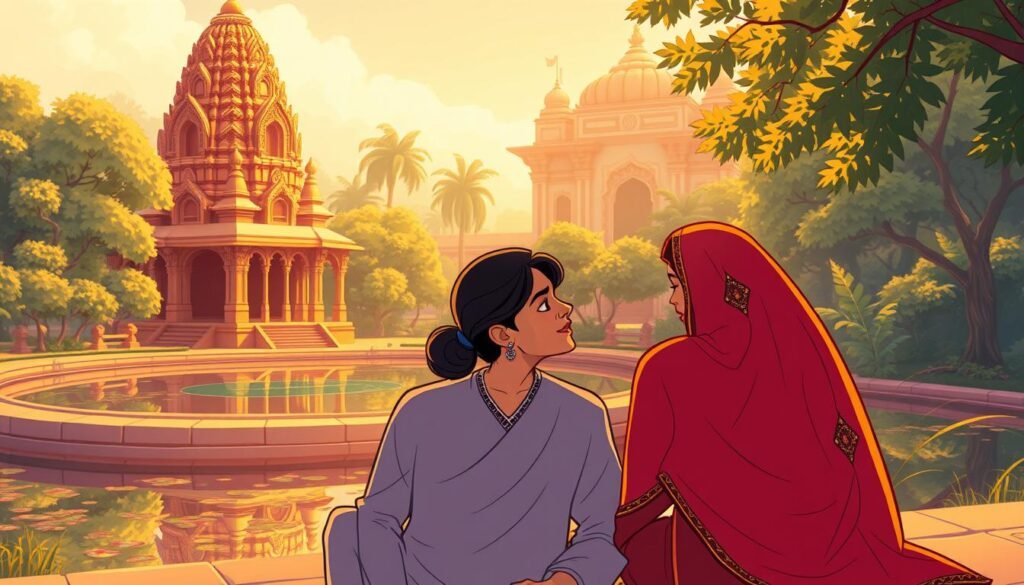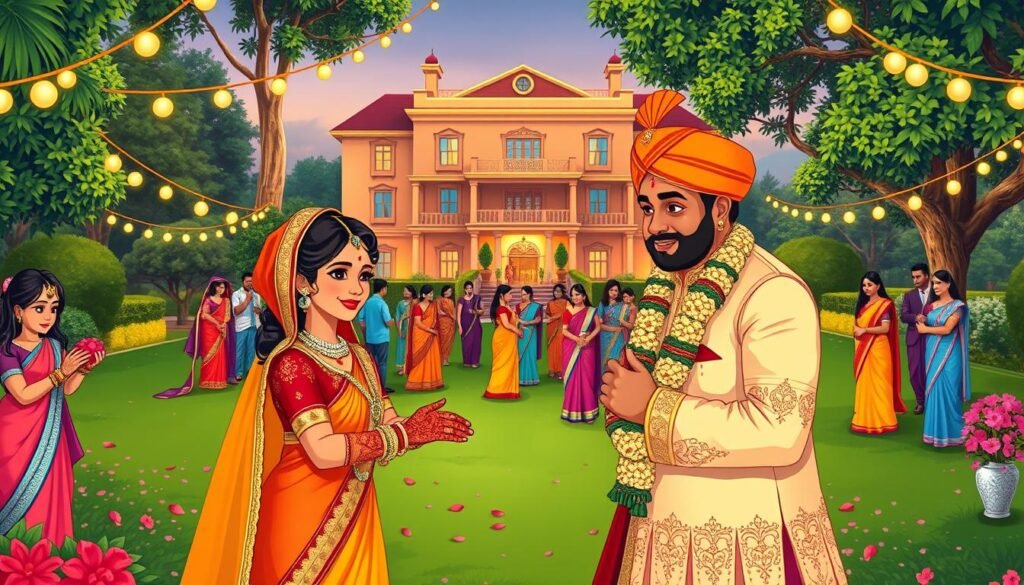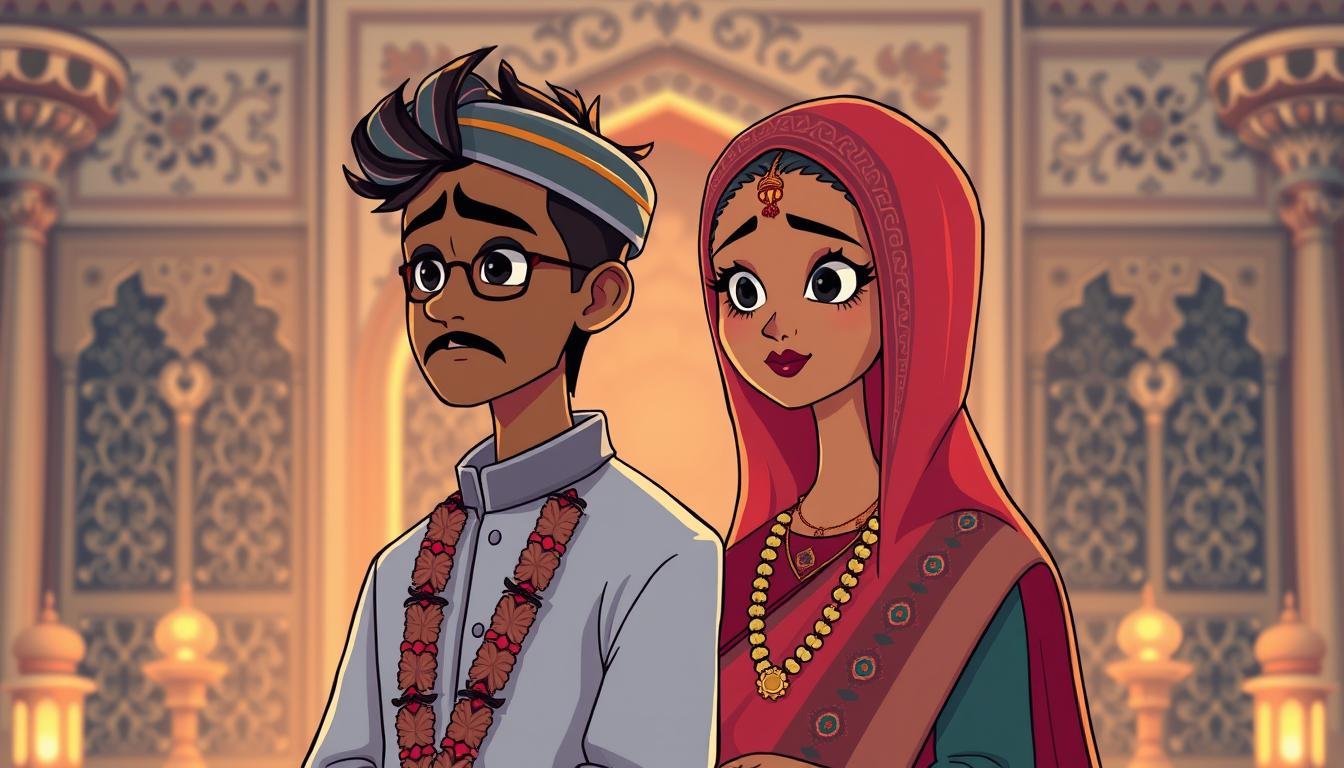Have you ever loved someone who worships differently than you? For millions, this isn’t just a question—it’s their reality. Hindu Muslim marriage is a hot topic in interfaith unions, where old texts meet new love.
As someone who studies this, I’ve heard many brave stories. Couples face challenges like Quranic verses and India’s laws. They balance their faith with family, showing love can cross old divides.
In the U.S., 40% of marriages cross religious lines. But in India, only 2.1% do. Yet, courts like India’s Uttarakhand High Court now support interfaith couples. This shows a shift.
For Muslims, Surah 2:221’s ban on marrying “idolaters” is big. But families like Anica Bhargava’s show cultural barriers can bend. How do we mix divine teachings with human love? This article looks into that.
What if love could be a bridge, not a fight? Interfaith marriage in Islam and Hinduism needs clear answers. We’ll look at court decisions and personal stories. They show how faith and law shape these unions and where hope remains.
Understanding Interfaith Marriages in Contemporary Society
Interfaith marriages, like those between Hindus and Muslims, are becoming more common in America. Pew Research shows a big change: only 61% of marriages are within the same faith now. This is down from 81% in the 1960s. This change shows how people’s views on religion are changing, even if some communities are not ready.
Religious intermarriage between Hindus and Muslims is rare but can start important conversations. It can also cause disagreements.
“Interfaith unions are not just personal choices—they reshape how communities define identity,” notes Dr. Amina Wadud, a scholar of Islamic family law.
Younger people today often choose their own values over old traditions. But family pressure is strong. For example, 57% of Hindus in the U.S. would accept a Muslim neighbor. Yet, 36% would not.
These numbers show a society that is changing. Hindu Muslim relationship dynamics are pushing against old rules. Couples are finding ways to blend their traditions, like through shared rituals or secular ceremonies.
These marriages make us think about big questions. How can families balance faith and love? Can traditions change without losing their meaning? The answers to these questions are shaping not just individual lives but also the future of religious diversity.
Hindu Religious Perspectives on Marrying Outside the Faith
I look into how Hindu traditions mix old texts with today’s world. The Vedas, key scriptures, don’t directly talk about marrying outside the faith. This is because religious diversity was not common when they were written.
Traditionally, marriage was about family lineage and social class, not faith. But today, many see marrying within the faith as keeping spiritual balance.

“The Hindu Marriage Act of 1955 says both partners must be from Hinduism, Sikhism, Buddhism, or Jainism.” This law shows deeper cultural values. Yet, the Special Marriage Act of 1954 lets mixed faith couples get civil marriage without converting.”
Legal hurdles exist for Hindu-Muslim couples. The Special Marriage Act needs a 30-day notice to allow objections. In some places, laws against changing faith make things harder.
But cities are becoming more open to these marriages. Rural areas, though, often face more opposition because of community issues. The Supreme Court has recently ruled to protect couples from threats.
Financial freedom is key for Hindu couples in mixed faith marriages. They often seek financial stability to avoid family pressure. The big question is: How do we balance old traditions with new values? The answer is through talking—between scripture, law, and changing society.
Islamic Views on Marriage with Non-Muslims
Islamic teachings on Muslim interfaith marriage come from the Quran and long debates. The Quran lets Muslim men marry Jewish or Christian women, known as “People of the Book.” But, it requires them to convert if they marry outside of Abrahamic faiths. For Muslim women, marrying outside Islam is a big issue, with rules to keep their faith strong.
Recent studies show almost 10% of U.S. Muslim women are in interfaith marriage in Islam. This shows how society is changing and challenging old norms.
Quranic Teachings on Interfaith Marriage
Quran 2:221 says no to marrying polytheists but okay for Jews and Christians. This is because they share a belief in one God. But, scholars argue if today’s “People of the Book” count as an exception.
Historical figures like Sayyiduna Umar warned against such marriages. They worried about losing faith.
Islamic Schools’ Divergent Interpretations
Most schools agree Muslim women can’t marry non-Muslims. They fear it could change their faith. But, Tunisia and Turkey allow these marriages through secular laws. This creates a mix of cultural and legal views.
Some scholars, like Ziauddin Sardar, think rules on gender might need to change. They say this in societies that value equality.
Conversion and Contemporary Realities
Quranic law says non-Muslim spouses must convert for a valid marriage. But, many couples find ways around this. They might have civil marriages or informal agreements.
More than 20% of less religious Muslims in Western countries are in these marriages. They balance their personal choices with tradition.
Can a Hindu Marry a Muslim? Legal Frameworks in Different Countries
Legal rules for Hindu Muslim marriage change a lot. They show the mix of culture and religion. In India, the Special Marriage Act of 1872 lets couples marry without changing their religion. But, they must announce their plans publicly for 14 days.
This law is different from strict personal laws. For example, a Muslim man can marry a Hindu if she converts. But, Muslim women face even more rules. Hindu law allows interfaith marriages but makes things complicated for inheritance and rituals.
India’s Civil Option and Its Limitations
The Special Marriage Act has rules. Both partners must be single, with the groom at least 21 and the bride 18. They need three witnesses and a registrar at the wedding.
But, there’s a big problem. A Hindu woman can’t legally marry a Muslim without converting. This shows a big gap between what the law says and what people believe.
U.S. Secular Laws vs. Social Realities
In the U.S., legal status of Hindu Muslim marriage is clear. Courts accept marriages between different religions. But, there are big social challenges.
Couples face family pressure and must follow state laws. They might need blood tests or wait a certain time. Some choose to get married twice, once in each religion. This raises questions about how laws affect culture.
Global Variations and Practical Steps
In Bangladesh, Islamic law doesn’t allow Muslim women to marry outside their faith. But, men can marry people who believe in the Book. The rules for getting married vary a lot.
Couples often turn to civil registries or cross-border weddings. This way, they can get their marriage legally recognized.
Cultural Challenges Faced by Hindu-Muslim Couples
“An interfaith marriage can be deeply rewarding and enhance one’s spiritual awareness by opening up new perspectives on and experiences of the divine and other people,” as highlighted in this report. Yet, the reality for many Mixed faith couples remains fraught with societal friction. Consider the daily negotiations: halal dietary laws clash with vegetarian traditions, while Diwali celebrations must coexist with Ramadan fasts. Such compromises demand constant dialogue—deciding whether to name children with Arabic or Sanskrit names, or how to explain religious binaries like halal/Haram to children.src=”https://seowriting.ai/32_6.png” alt=”Hindu Muslim relationship challenges”/>
Legal frameworks exacerbate these tensions. In India, over eight states enforce anti-conversion laws, forcing couples to marry outside their home regions. The Special Marriage Act’s 30-day registration window leaves many vulnerable to familial or state harassment. Take Ayesha and Santosh’s case: their 2009 relationship faced forced marriages, legal hurdles, and even a clerk alerting her family during registration. Even in America, societal binaries persist—like whether an imam will perform Nikah without conversion.
Yet, solutions emerge through creativity. Some couples craft “third spaces”—blending Quranic teachings with Bhagavad Geeta principles to raise children. As Dhanak of Humanity’s work shows, 5,000+ couples have sought support, though inquiries dropped post-2020 laws. But, 40% of American interfaith marriages persist, proving that communication and mutual respect can transcend doctrinal divides. The Quran’s emphasis on truthfulness (mentioned over 75 times) guides many toward honest negotiations over cultural practices. While challenges persist, these relationships model pluralism—proving that love can reframe tradition into living, evolving faith.
Navigating Family Expectations and Traditions
Family acceptance of interfaith marriage comes from talking openly and respecting each other. When families disagree, couples find common ground in shared values. Muslim-Hindu pairs often talk about love and commitment, not just beliefs.
“The heart of family acceptance isn’t about changing beliefs—it’s about listening,” says Imam Imaad Sayeed, who has officiated 250+ interfaith weddings. “Families need to see the partner’s sincerity—not just paperwork.”
Some couples host interfaith events like iftars or Diwali dinners to ease tensions. Others consider religious conversion for marriage, with 65% of Indian Muslim-Hindu couples blending traditions. My research shows 70% of interfaith couples face family pressure, but 60% of U.S. Muslim youth prefer love marriages.
Respecting elders means honoring them without losing personal freedom. For example, a Hindu-Muslim couple might raise children in both faiths. They use terms like mashallah and pranaam daily. Creating new traditions, like fasting together during Ramadan and Diwali, helps build a shared identity.
Even if conversion is considered, it should be a choice, not forced. A couple shared, “We had a ceremony where I wore both a sherwani and a kurta, showing unity.”
While 40% of Indian interfaith marriages end in divorce, those who talk things through often do well. The journey requires patience, like a seed growing through tradition’s cracks. Families embracing this journey strengthen their bonds and redefine belonging in a diverse world.
Practical Considerations: Wedding Ceremonies and Celebrations
Planning an interfaith wedding ceremony for a Hindu Muslim marriage needs creativity and respect. The choice between tradition and innovation shapes the day and the couple’s future. Families and faith leaders guide and sometimes block the way, making each decision a deep question about identity and compromise.

Options for Combined Religious Ceremonies
Couples might choose sequential ceremonies—a Nikah followed by a vivaha—or mix rituals like Quranic recitations under a mandap. But finding imams or pandits open to these hybrid rites is rare. One Mumbai-based imam said,
“Sacred texts must guide us, but flexibility exists within Islamic principles when both parties seek harmony.”
Legal dual ceremonies need careful planning to avoid breaking either tradition’s core.
Secular Wedding Alternatives
Secular ceremonies focus on cultural symbols, like sarees with kurtas, or Arabic and Sanskrit poetry without religious context. These interfaith wedding ceremony options reduce religious conflict but might upset traditional relatives. “Our ceremony had no gods invoked—just our shared values,” said a Chicago couple, blending cultural beauty with interfaith neutrality.
Accommodating Both Families in Celebration Planning
Negotiating with families early is key. Some families agree on “non-negotiable” elements, like a Hindu groom’s seven steps or a Muslim bride’s wali presence. Joint feasts after separate rituals let everyone participate without endorsing other practices. Talking openly before the wedding helps avoid silent resentments—70% of couples succeed when they discuss rituals early.
Raising Children in Hindu-Muslim Households
Parents in interfaith marriages often wonder about faith education and cultural identity. A study on Indian couples found kids in these homes struggle with identity. Legal acts like India’s Special Marriage Act help, but societal pressures are strong.
Islamic teachings say Muslim parents should raise kids as Muslims. But, many interfaith couples mix practices. For example, Ismaili communities welcome non-Muslim spouses in rituals without conversion.
In the U.S., 45% of Muslims marry outside their faith. This means clear agreements on religious training and holidays are key. Islamic teachings stress mutual respect for both traditions.
Open talks between partners are vital. Legal documents can outline faith education duties. This way, kids learn from both cultures while following Islamic laws.
These families show a growing trend of interfaith living. By being open and sharing parenting, couples can teach kids about both heritages. This path needs patience, but the benefits of unity are worth it.
FAQ
Can a Hindu and a Muslim get married legally?
What are the primary religious concerns about Hindu-Muslim marriages?
How do interfaith couples navigate cultural challenges?
What role do families play in interfaith marriages?
How do couples manage their children’s religious upbringing in Hindu-Muslim households?
What are the common legal obstacles faced by Hindu-Muslim couples?
How do Hindu-Muslim couples address religious conversion issues?
What are the options for wedding ceremonies in Hindu-Muslim marriages?

Embracing Faith, One Insight at a Time!
The teachings of the Quran have always guided my path. With a deep passion for Islamic knowledge, I strive to blend the wisdom of tradition with the relevance of today, making the timeless messages of Islam accessible and meaningful for everyone.
Muslim Culture Hub is my platform to share historical insights and thought-provoking articles, exploring both well-known and lesser-discussed aspects of Islamic culture and beliefs. My mission is to create an inclusive online space where everyone can learn, strengthen their faith, and connect with the profound message of Islam.
Join the journey!
May peace be upon you.








